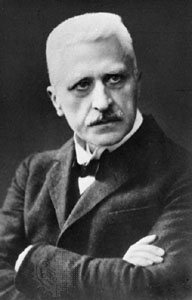Rudolf Otto
| Rudolf Otto | |
|---|---|
 |
|
| Born |
25 September 1869 Peine, North German Confederation |
| Died | 6 March 1937 (aged 67) Marburg, Germany |
| Cause of death | Pneumonia |
| Academic background | |
| Alma mater | |
| Influences | Friedrich Schleiermacher, Immanuel Kant, Jakob Fries |
| Academic work | |
| Discipline | Theology and comparative religion |
| Notable works | The Idea of the Holy |
| Notable ideas | The numinous, the , the , the , the ganz Andere |
| Influenced | Eliade, Jung, C. S. Lewis, Tillich, Barth, Rahner, Heidegger, Wach, Horkheimer, Gadamer |
Rudolf Otto (25 September 1869 – 6 March 1937) was an eminent German Lutheran theologian, philosopher, and comparative religionist. He is regarded as one of the most influential scholars of religion in the early twentieth century and is best known for his concept of the numinous, a profound emotional experience he argued was at the heart of the world's religions. While his work started in the domain of liberal Christian theology, its main thrust was always apologetical, seeking to defend religion against naturalist critiques. Otto eventually came to conceive of his work as part of a science of religion, which was divided into the philosophy of religion, the history of religion, and the psychology of religion.
Born in Peine near Hanover, Otto was raised in a pious Christian family. He attended the Gymnasium Andreanum in Hildesheim and studied at the universities of Erlangen and Göttingen, where he wrote his dissertation on Martin Luther's understanding of the Holy Spirit (Die Anschauung von heiligen Geiste bei Luther: Eine historisch-dogmatische Untersuchung), and his habilitation on Kant (Naturalistische und religiöse Weltansicht). By 1906, he held a position as extraordinary professor, and in 1910 he received an honorary doctorate from the University of Giessen.
...
Wikipedia
